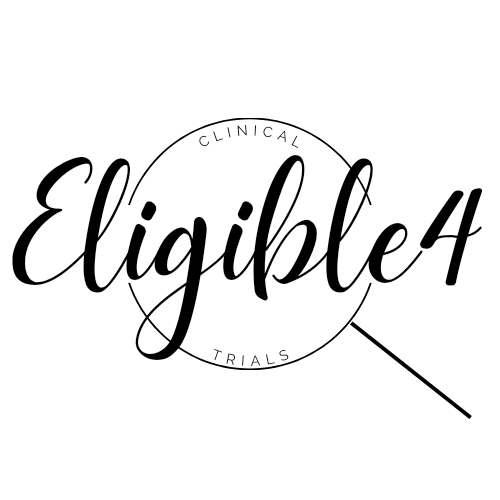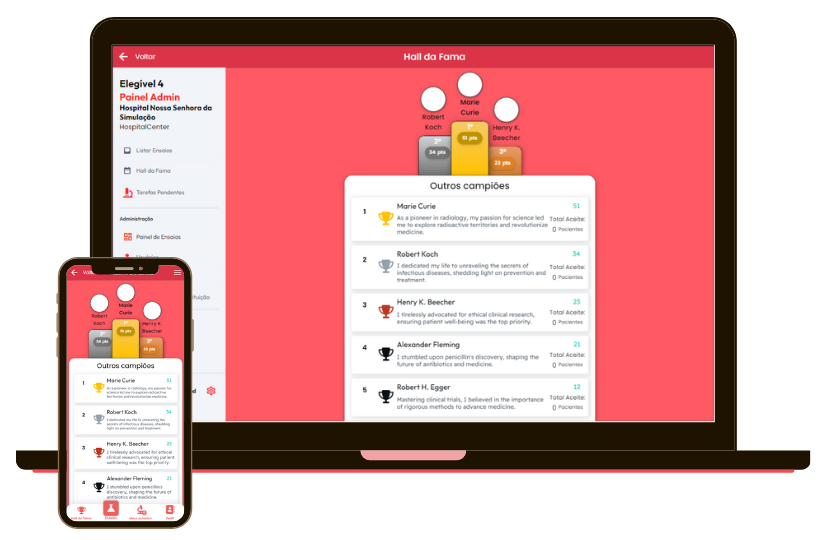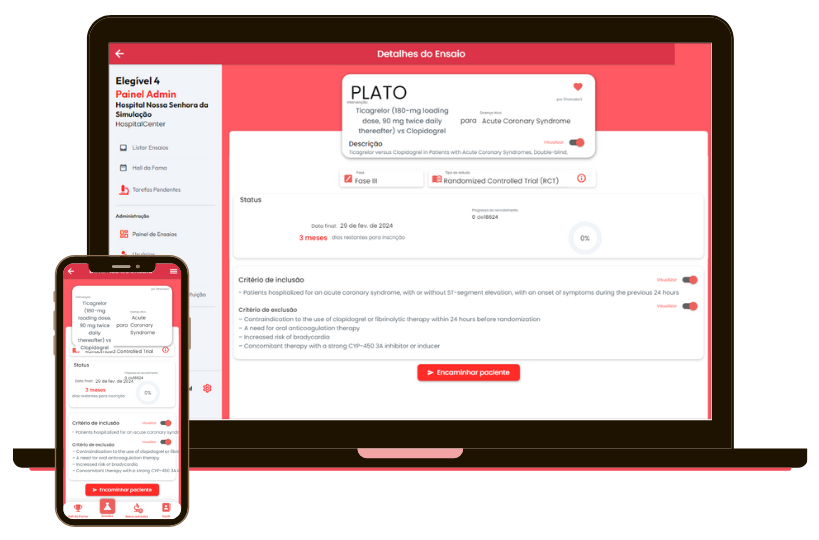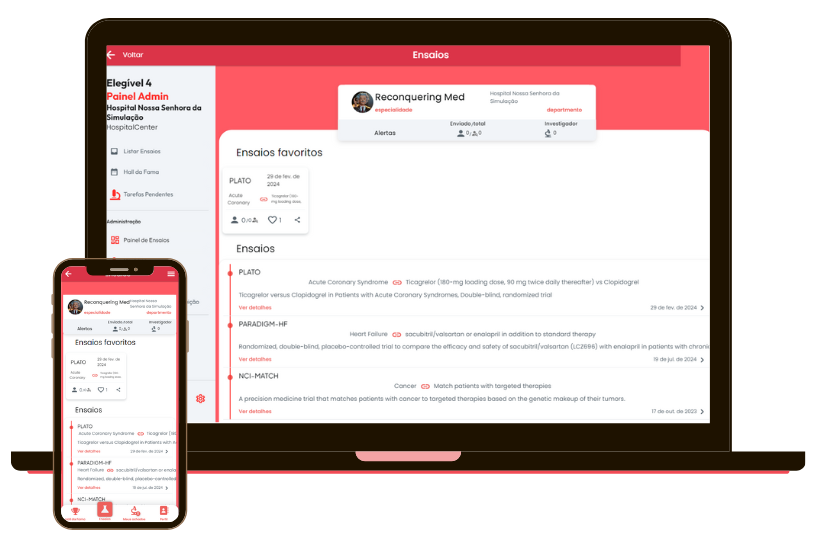# Pro Social Network for Clinical Trial Recruitment
App for patient referral to Clinical Trials and All Clinical research
Welcome to Eligible 4, the innovative app that is transforming the way doctors interact with clinical trials and simplifying the patient referral and clinical trial recruitment process.

How many Clinical Trials patients were randomized this year?
Are you a Hospital Manager, Resarch and Development leader, PhD fellow, Resident doctor, or Medical Director?
- Want to attract more clinical trials and secure funding for your institution?
- Do you wish to enhance the quality of referrals to reduce screening failures?
- Are you frustrated with the time spent sifting through databases?
- Does your department aspire to cultivate a stronger academic mindset?
- Do your residents need more opportunities for scientific publications?
Amazing Features
Encourage your entire institution to contribute in Clinical Trial Recruitment
Optimize high quality referrals from your collegues.
More screening = More randomization
Intead of relying in databases, algoritms or data minning to increase your screening failures. Recieve high quality referrals from your collegues improving randomization rates. Humans still do it better.
Easy to use
Easly search and find trials in your institution and other around you, in your country, in your world region.
Gamification
Scoring system to reward your healthcare profession within your institution. Project your institution by referring to others (altruistic contributions)
How Eligible 4 Works?
Each successful referral is scored, creating an engaging and rewarding experience.
Our Special Features
Developed for all clinical settings from university hospitals to primary care, Eligible 4 offers an intuitive and efficient approach to connecting doctors and researchers, driving significant advances in clinical research.
Pricing Plans
Research Team
- Unlimited Trials
- 1 Partner institution
- 3 Coordinator Profiles
- 5 Trials Shared (external)
- Access to country and world region
- AI generated protocols
Research Center
- Unlimited Trials
- 5 Partner institution
- 10 Coordinator Profiles
- 50 Trials Shared (external)
- Access to country and world region
- AI generated protocols
Academic Center
- Unlimited Trials
- Unlimited Partner institution
- 100 Coordinator Profiles
- Unlimited Trials Shared (external)
- Access to country and world region
- AI generated protocols
Trial Promoter
- Independent Trial and Center Sharing
- Access to country and world region
- Nacional Trial Statistics
Lovely Testimonials
Testimonials from the early stage surveys for idea validation. Soon to be replaced by the actual users!
Eligible 4 has revolutionized our approach to clinical trials. The platform offers global collaboration between institutions and facilitates participant recruitment. The ease of referencing is exceptional, speeding up the completion of tests. An indispensable tool for committed researchers
Eligible 4 is essential for advancing research into rare diseases. The multi-center social network not only facilitates patient discovery and sharing, but also offers a robust platform for data collection crucial to my PhD. The possibility of collaboration between experts around the world is invaluable, providing valuable insights into understanding and treating rare diseases. An indispensable tool to boost knowledge in such specific and complex areas
Eligible 4 is a catalyst for excellence in medical research. The platform not only facilitates data collection for our research work and clinical case series, but also recognizes and encourages our commitment. The incentives offered significantly value the work of interns, providing a stimulating environment for professional and academic development. A true revolution for the new generation of healthcare professionals.
Institutions
Clinical Trials
Successful Referrals
Pharmaceutical Partner
Frequently Asked Questions
Feel free to contact us if you have more questions.

Download Our App!
Try the app now today with our simulaiton institution.
Have free access to the comon country and world-regional portfolio.

Not ready yet?
Contact us!
Book a Meeting!
Latest News
Transforming Healthcare IT Systems with Lean Methodologies
Unlocking the Potential of Lean in Healthcare IT
In the fast-evolving world of technology, healthcare institutions face challenges in upgrading IT systems efficiently. Lean methodologies offer a solution by enhancing efficiency and validating innovations before substantial investments. By focusing on minimizing waste and maximizing efficiency, Lean principles streamline workflows and improve decision-making processes.
SLean’s Role in Transformation
The SLean Lean Six Sigma Healthcare Tool integrates Lean with Six Sigma, optimizing healthcare IT through streamlined processes and data-driven decisions. This ensures that healthcare facilities make strategic and beneficial technology investments.
PowerUp! Healthcare Performance: Elevate Employee Morale with Lean Processes
Unlocking the Power of Lean Processes in Healthcare
Discover how Lean processes can transform healthcare environments by enhancing employee morale and optimizing performance. By involving staff in meaningful improvements, fostering a culture of respect, and empowering decision-making, healthcare organizations can boost both morale and efficiency. Learn more about these strategies and see how they pave the pathway to excellence in healthcare.
Efficient Hospital Stretcher Tracking using RFID with low budget
This article details how to implement an efficient, budget-friendly hospital stretcher tracking system using RFID and BLE technologies, guided by Lean and Six Sigma principles. It addresses the challenge of creating a cost-effective solution, typically within an $18,000 annual budget, to enhance efficiency, improve patient care, and optimize resource allocation. The piece outlines a five-step implementation process, discussing the benefits of both BLE and RFID technologies, and provides a detailed shopping list for tracking 100 hospital stretchers within the specified budget. The aim is to centralize asset management and improve hospital operations.







